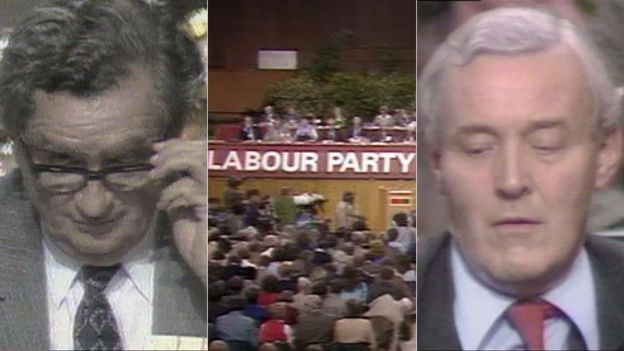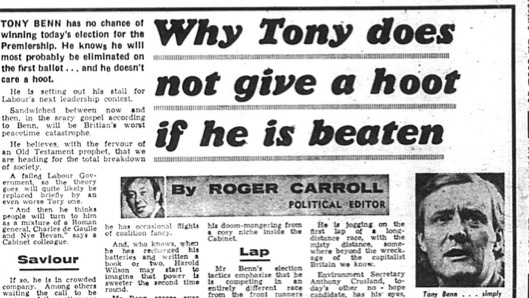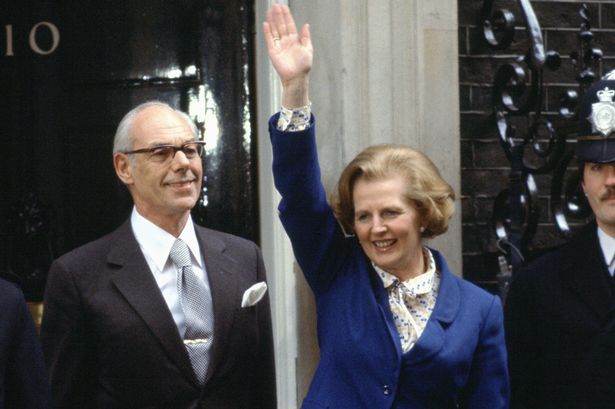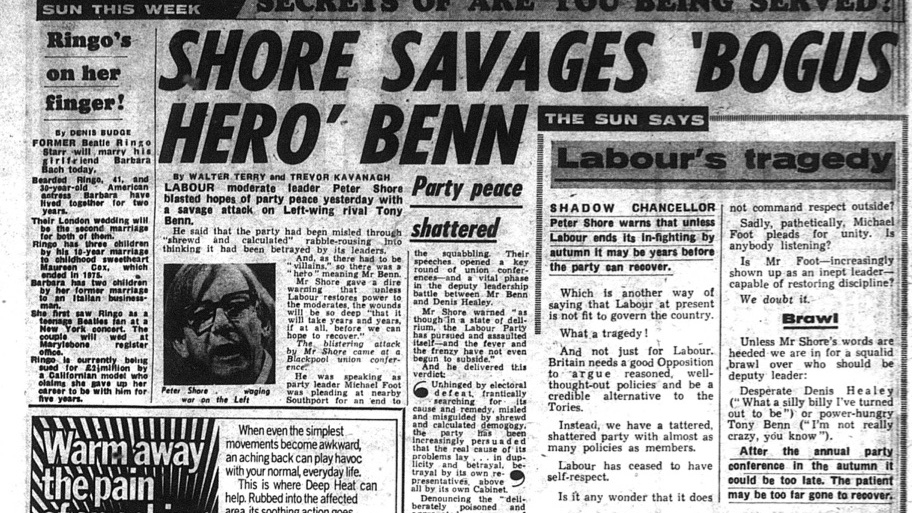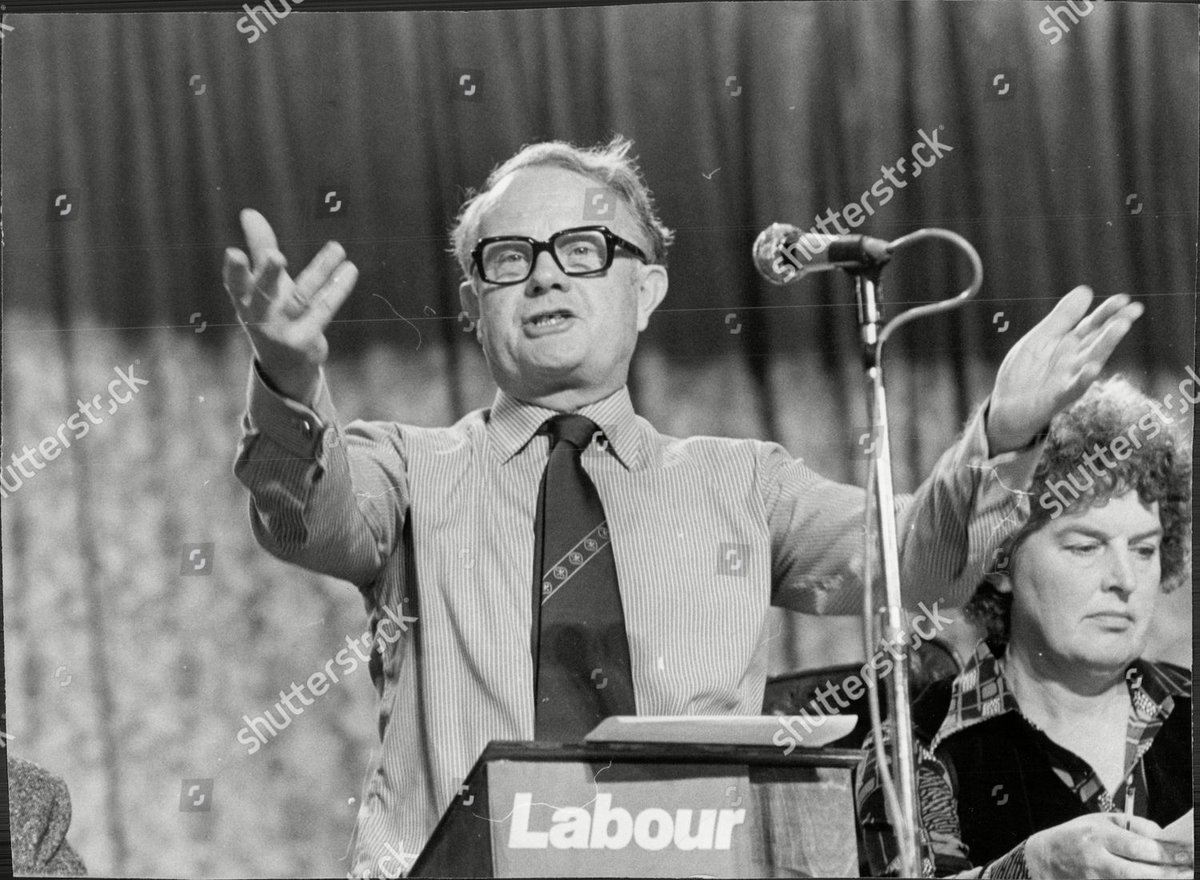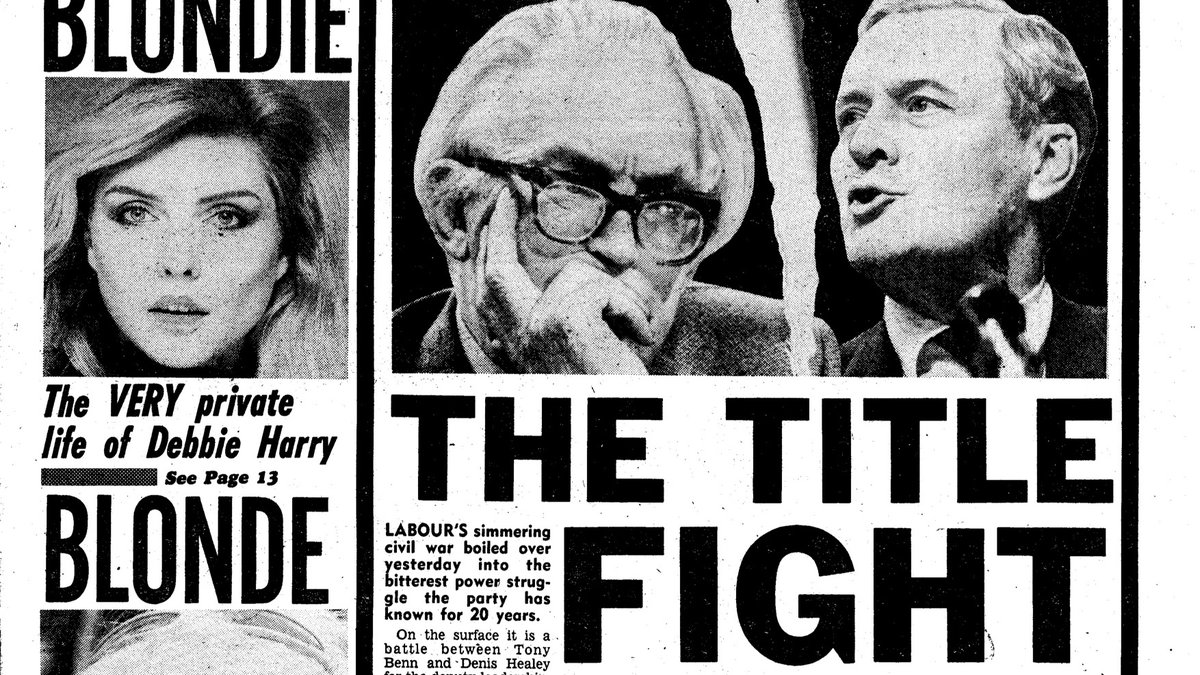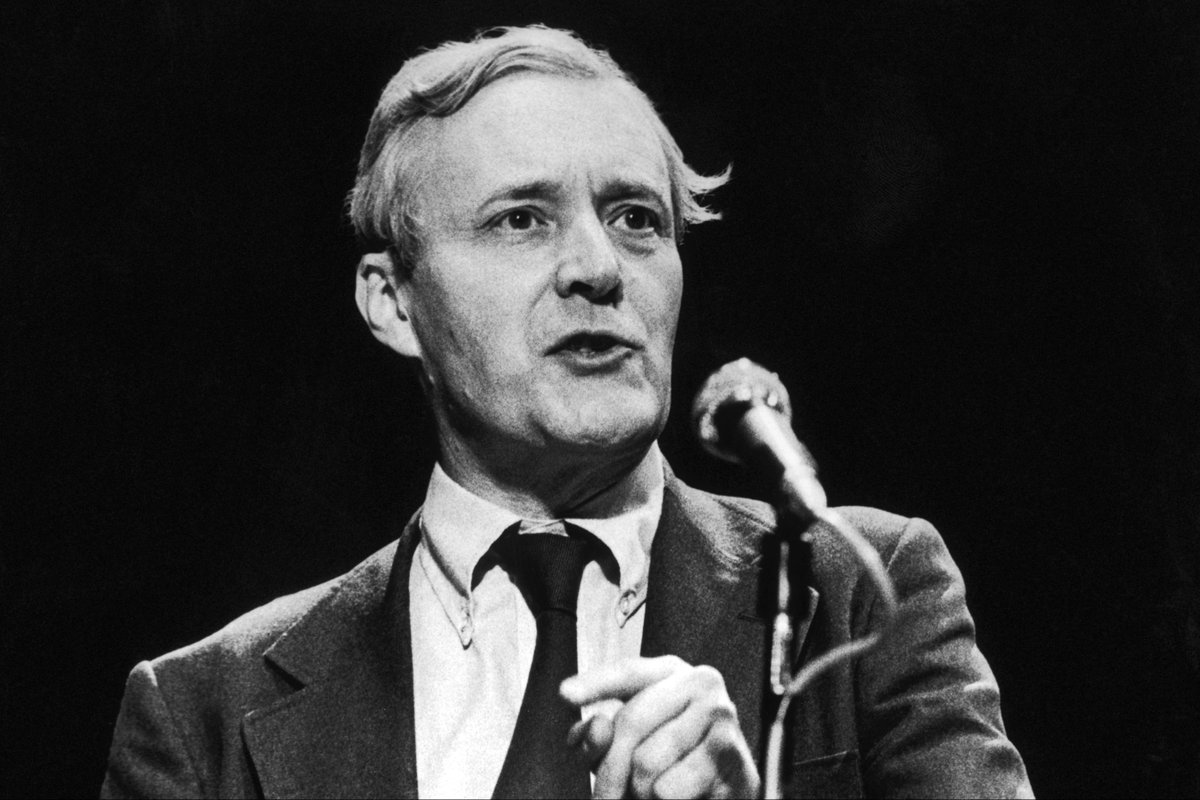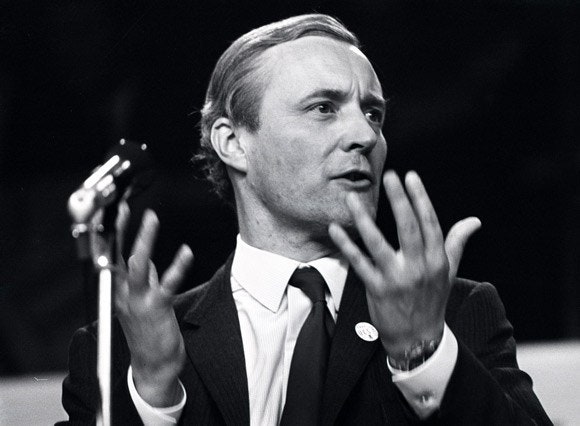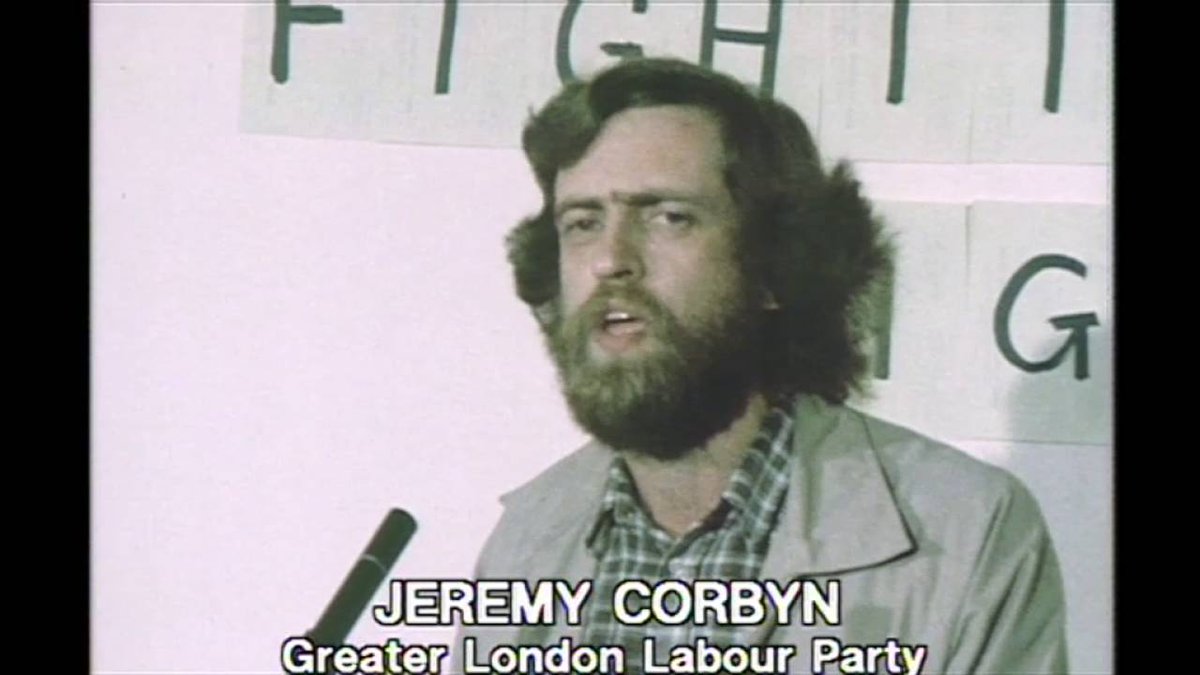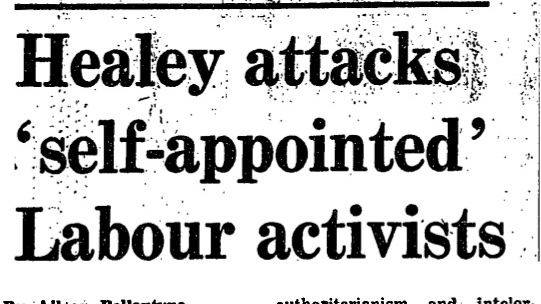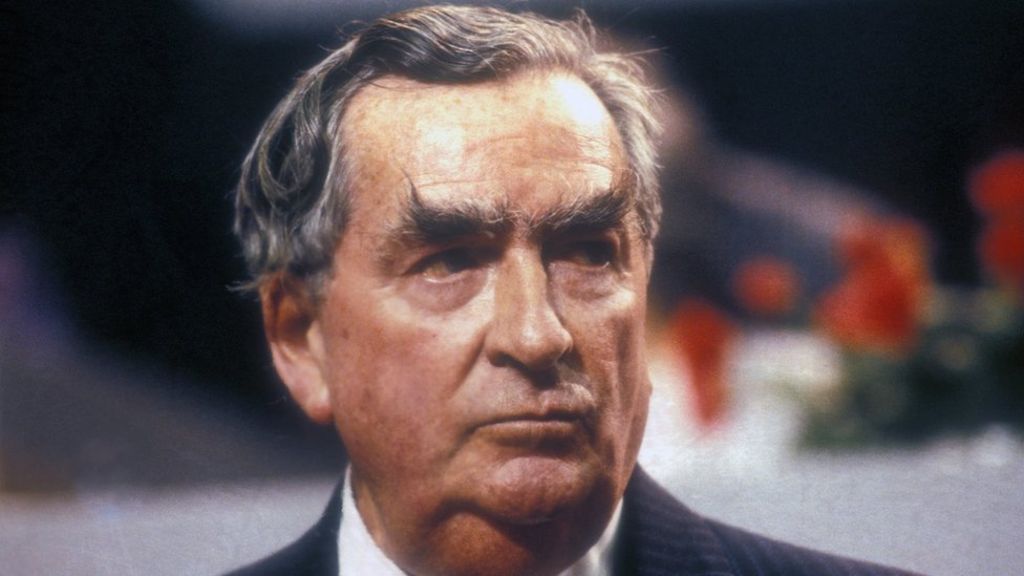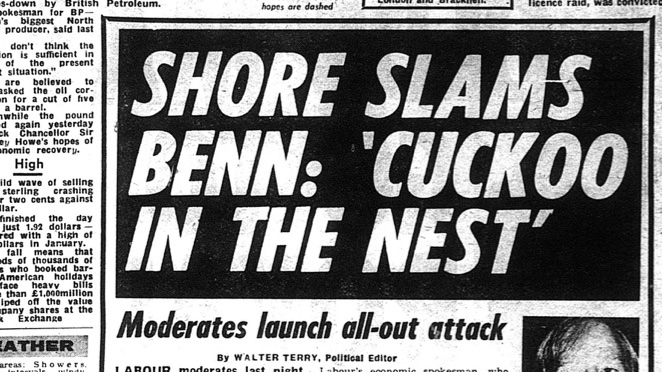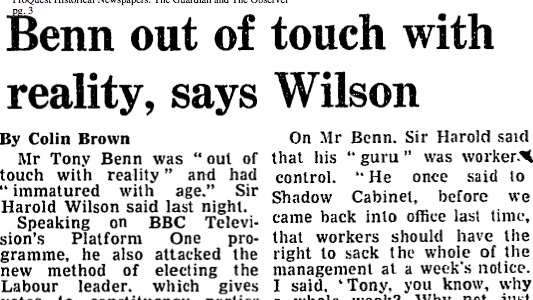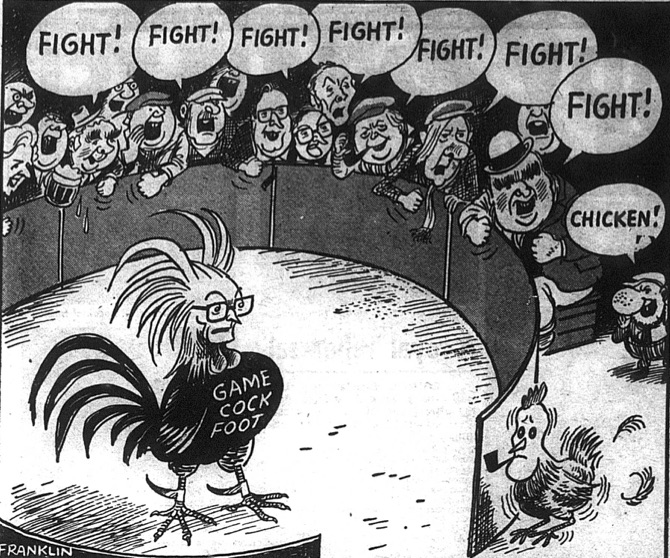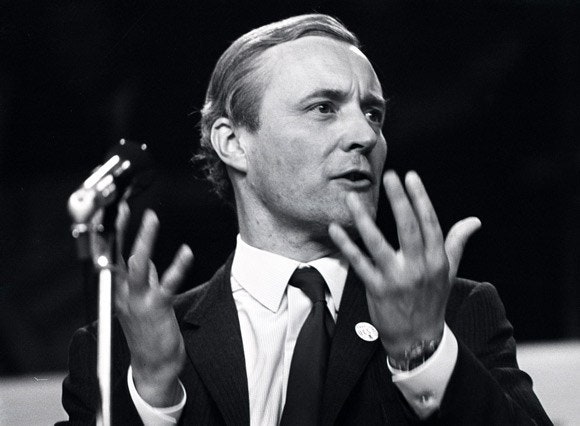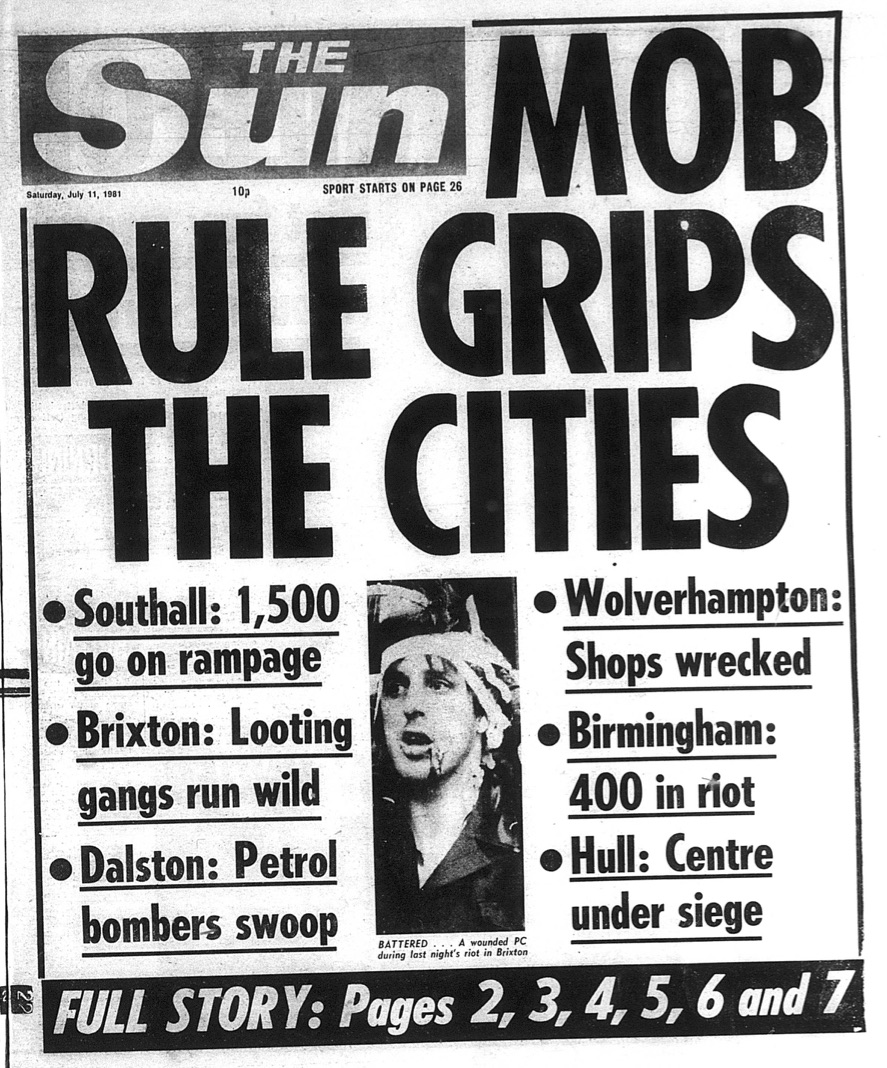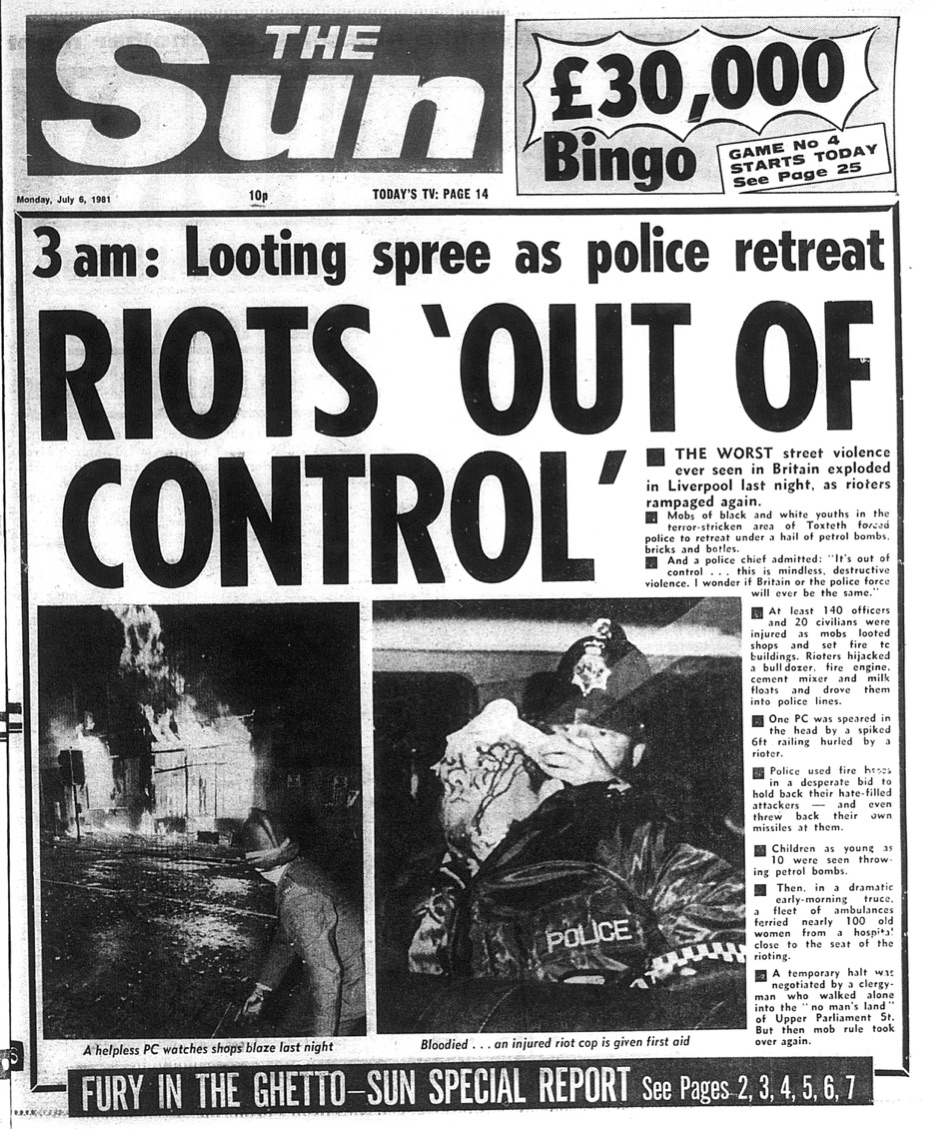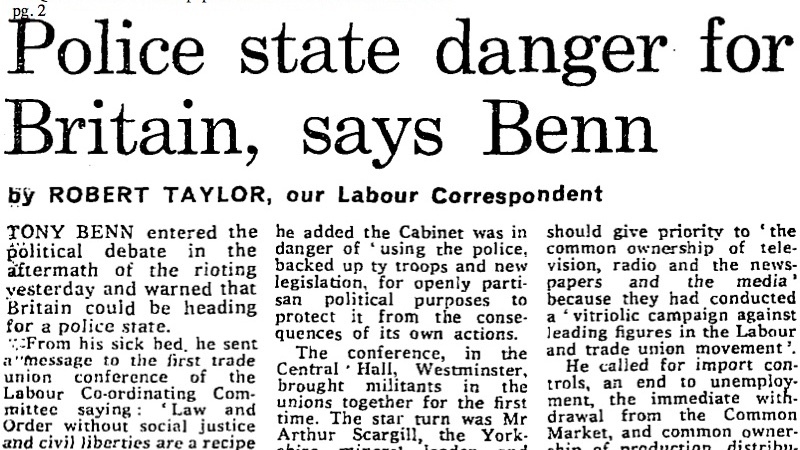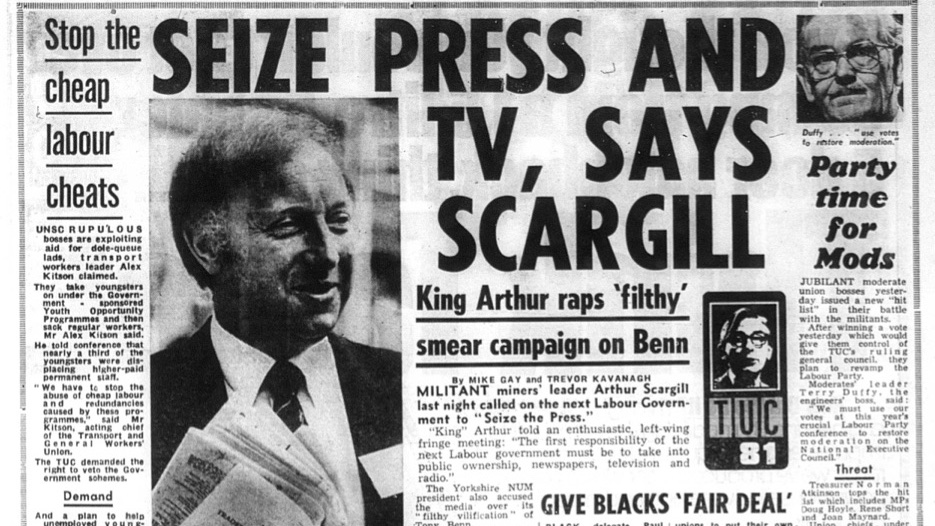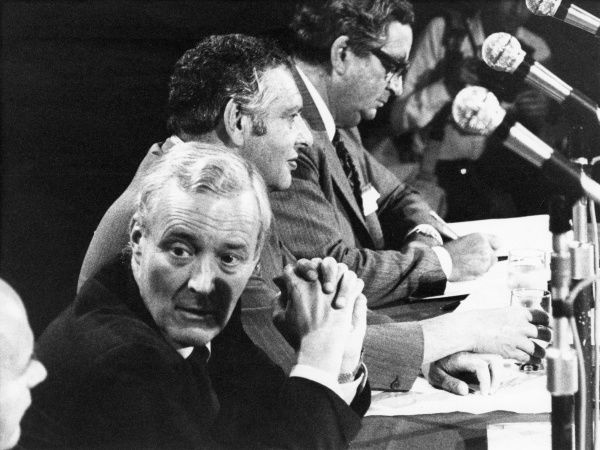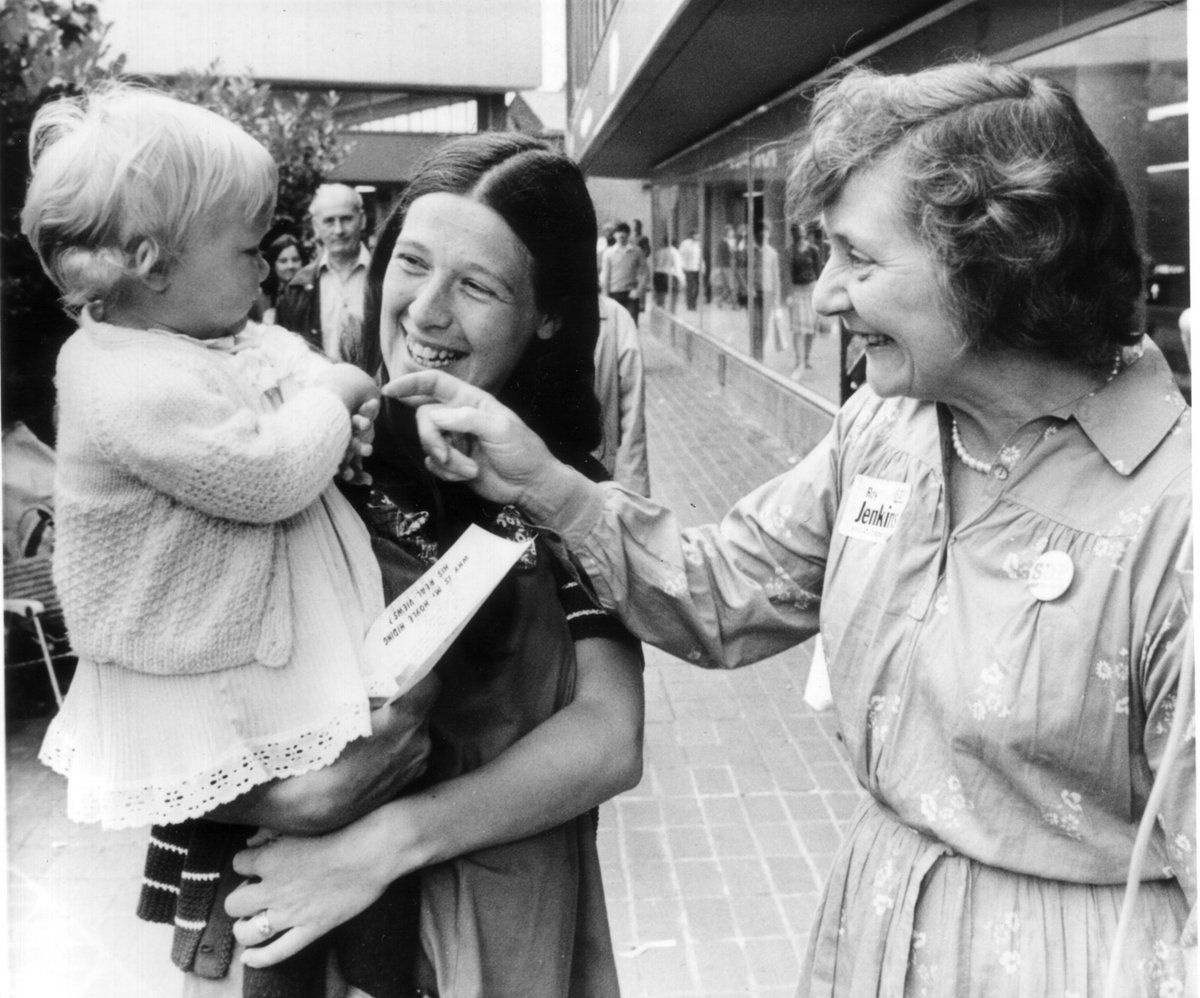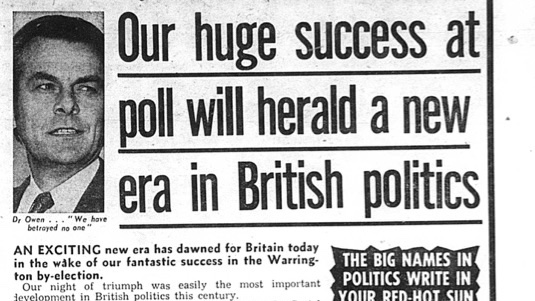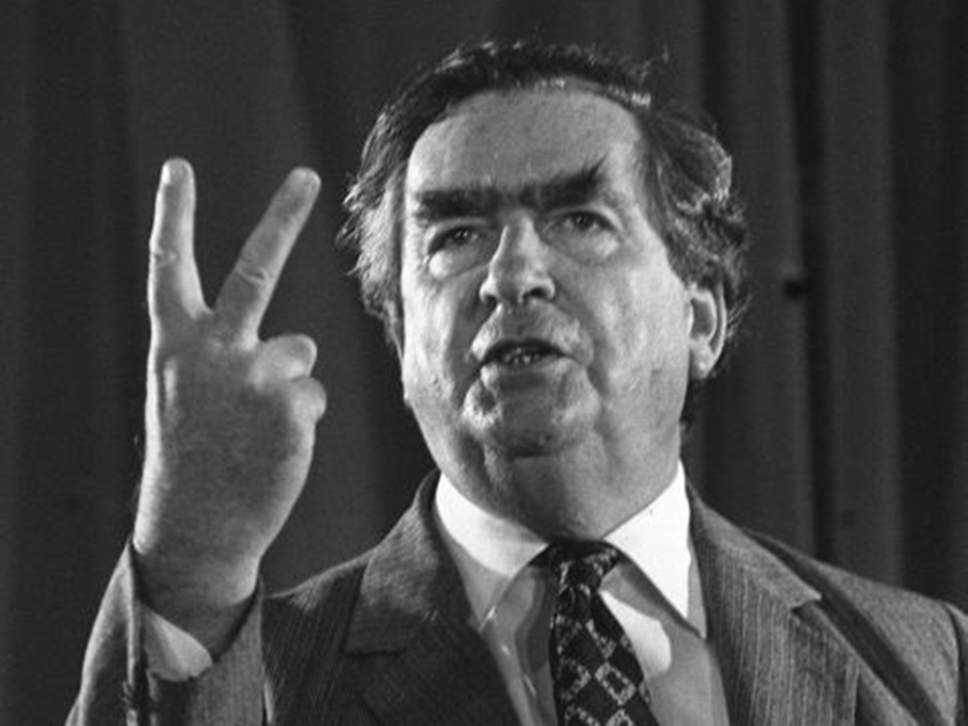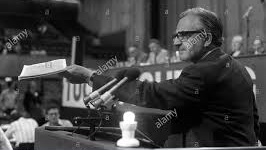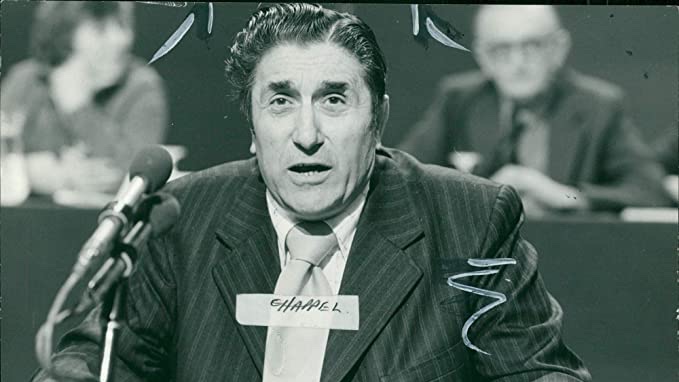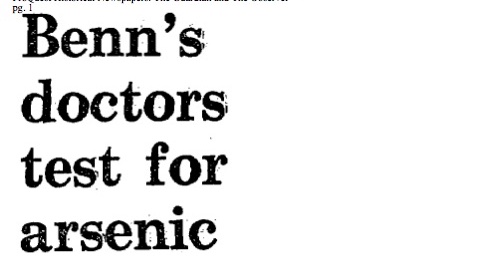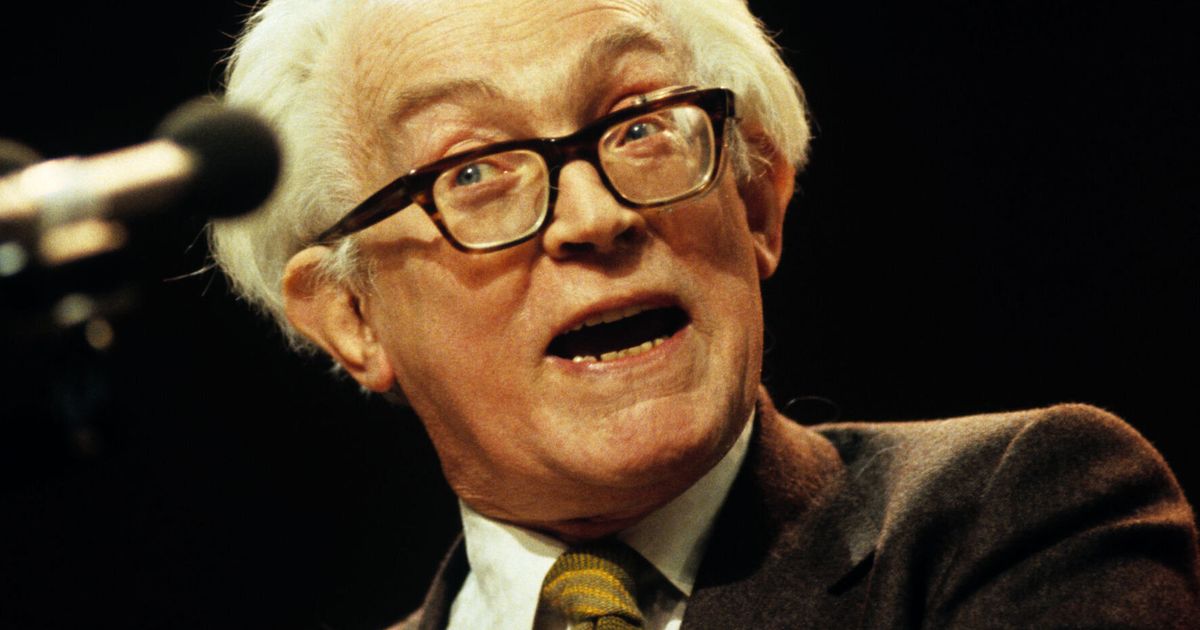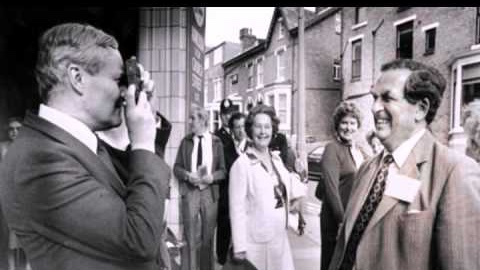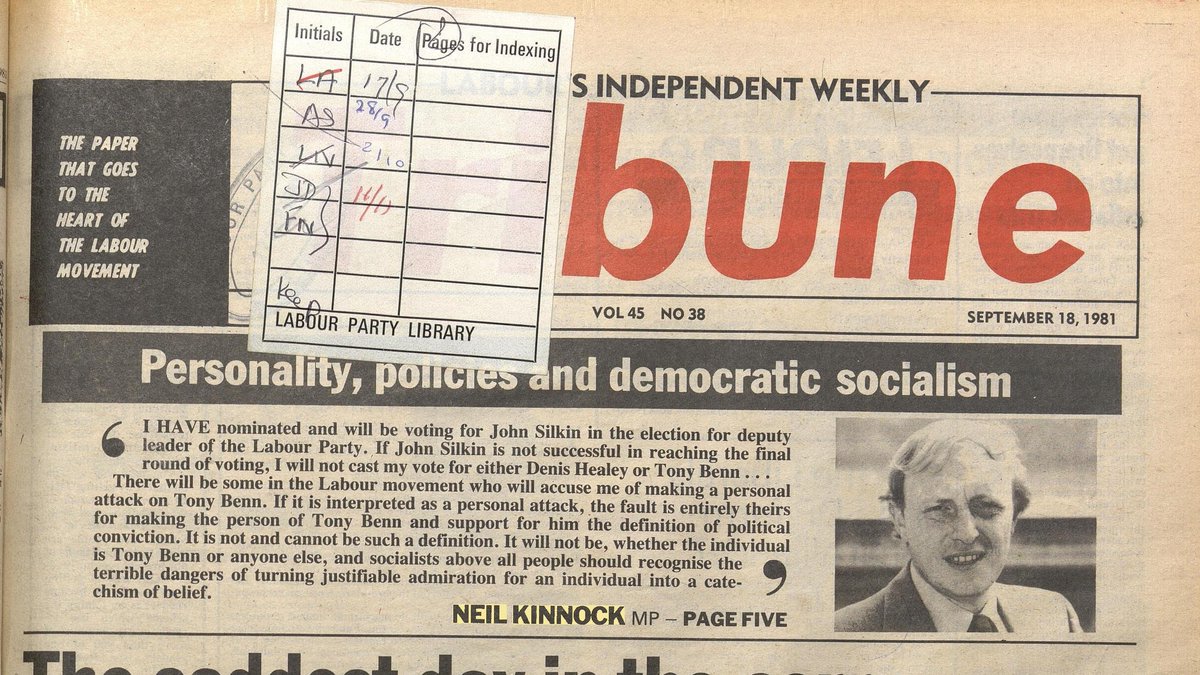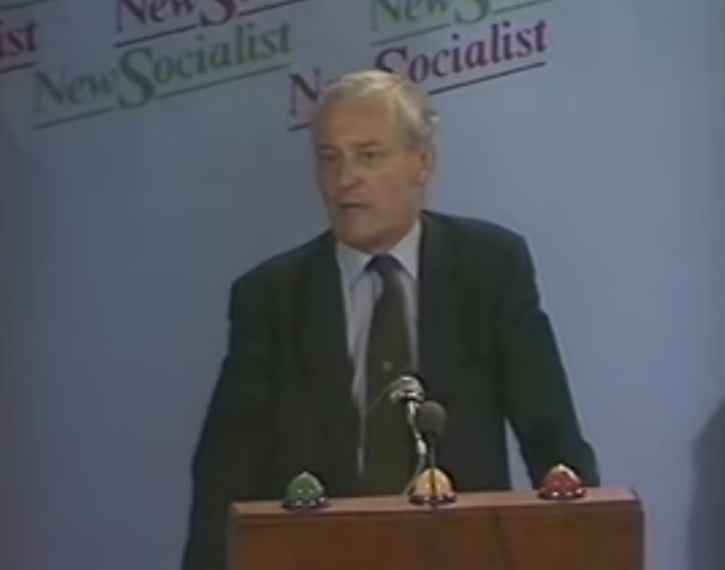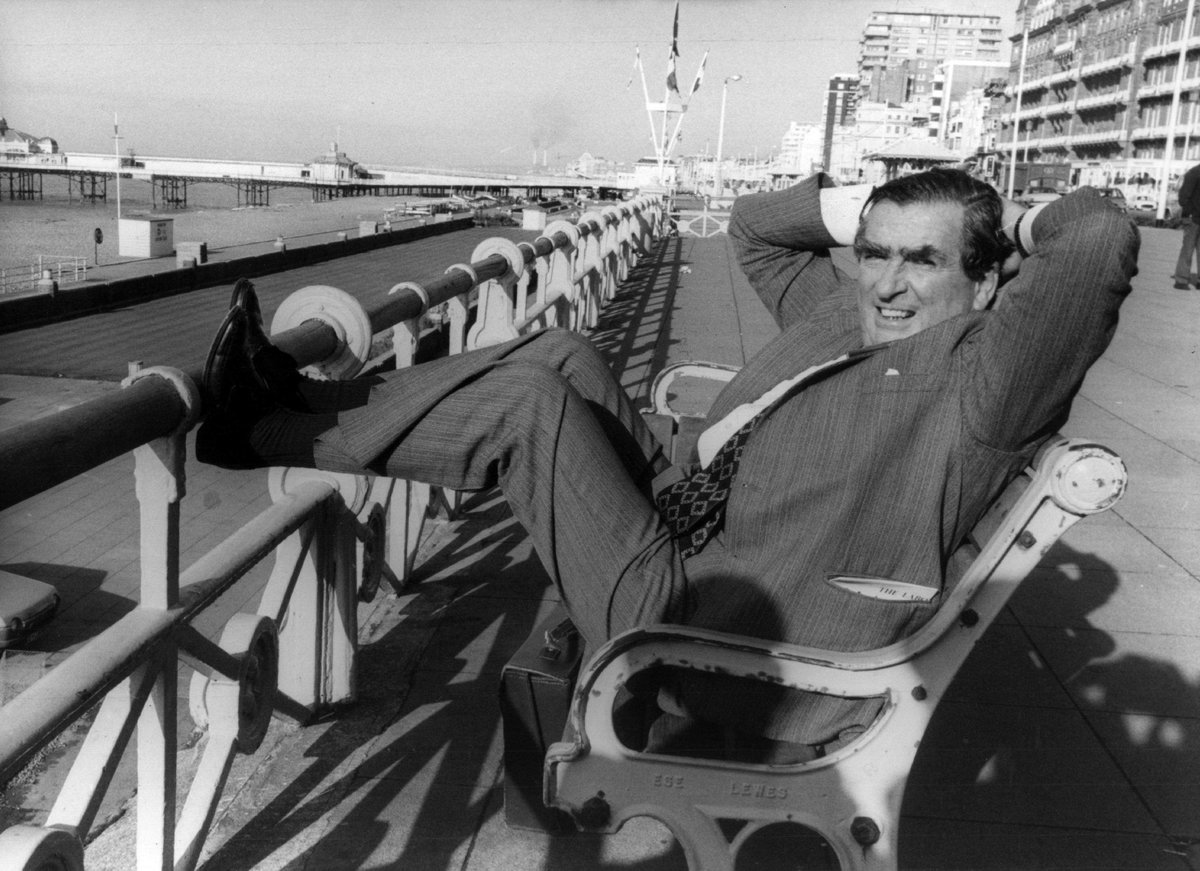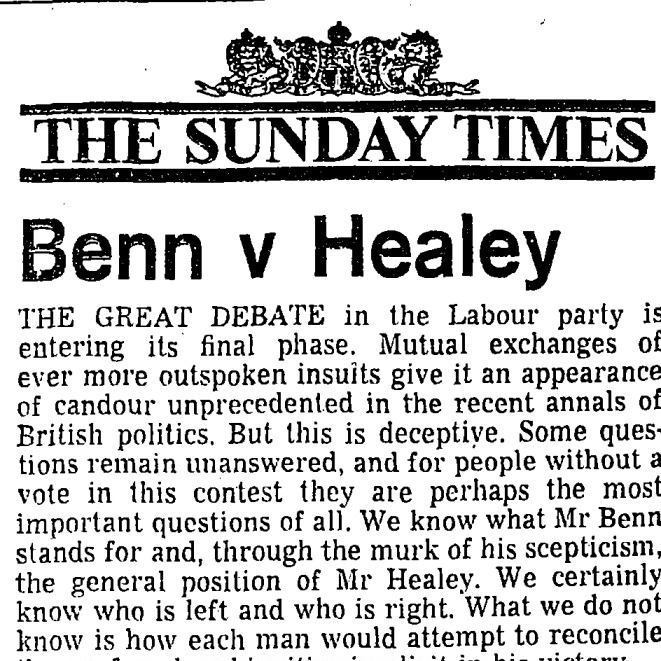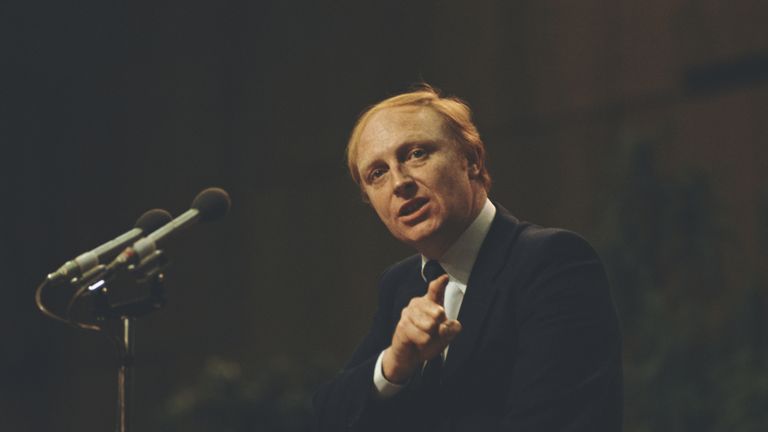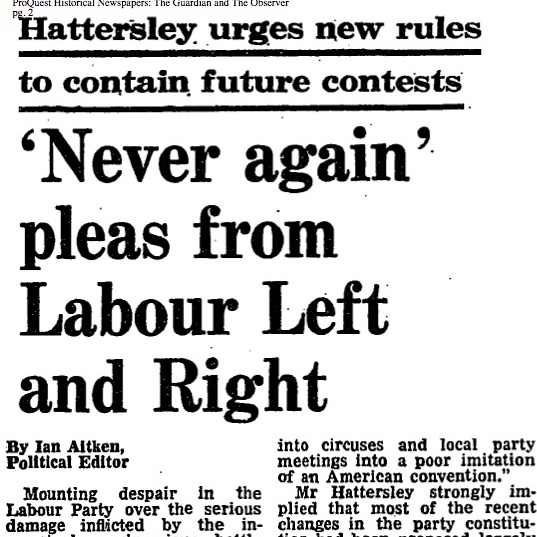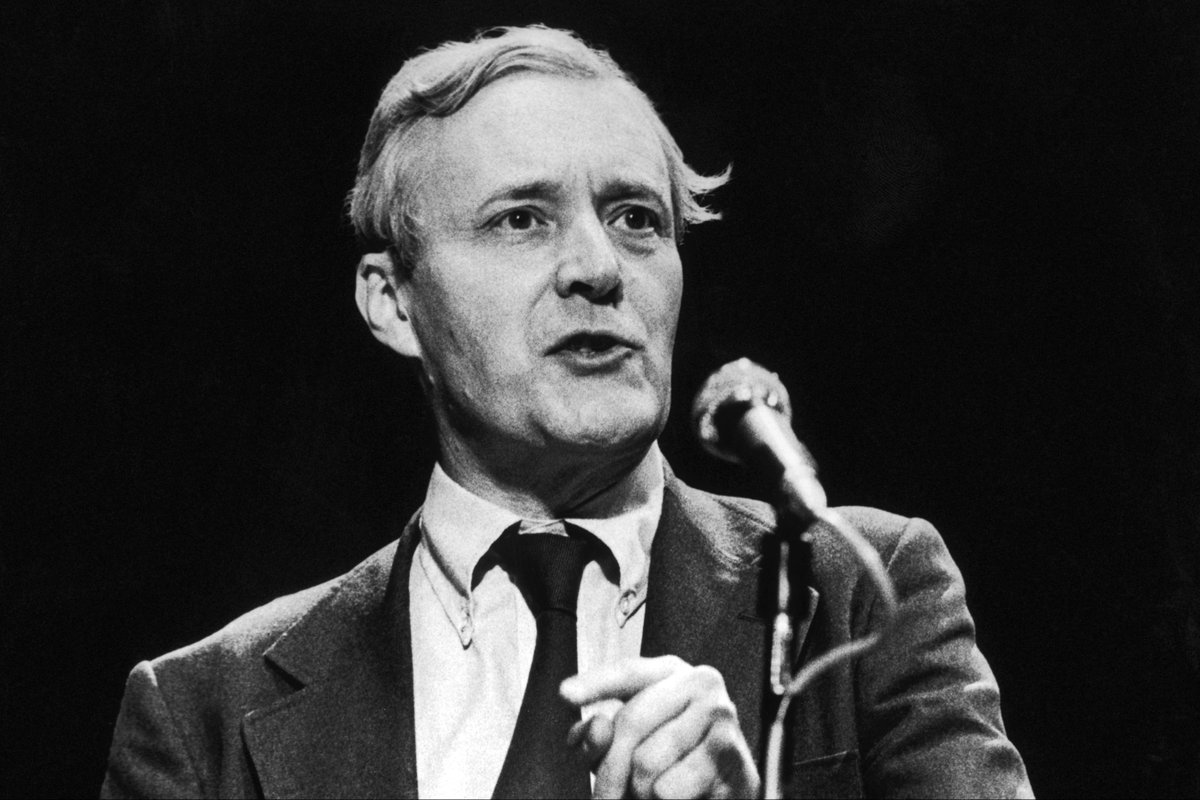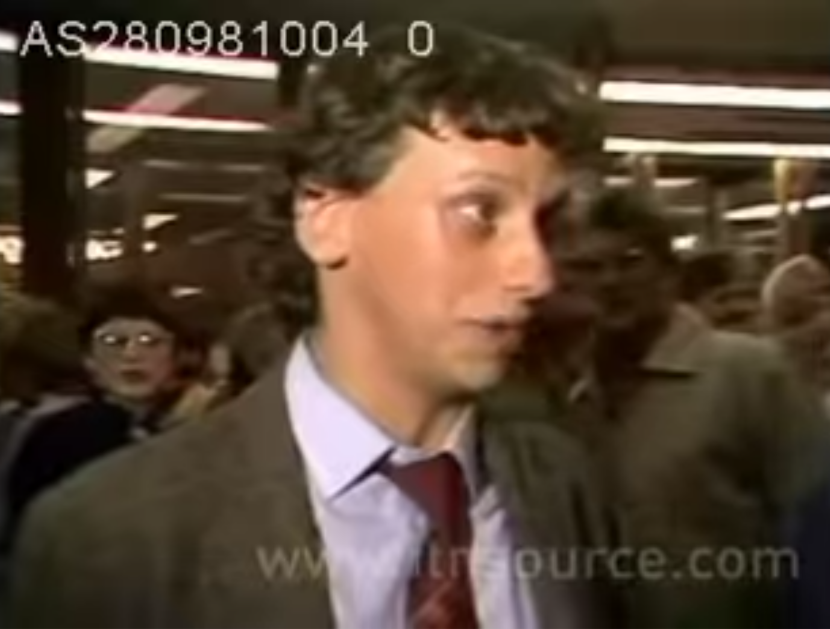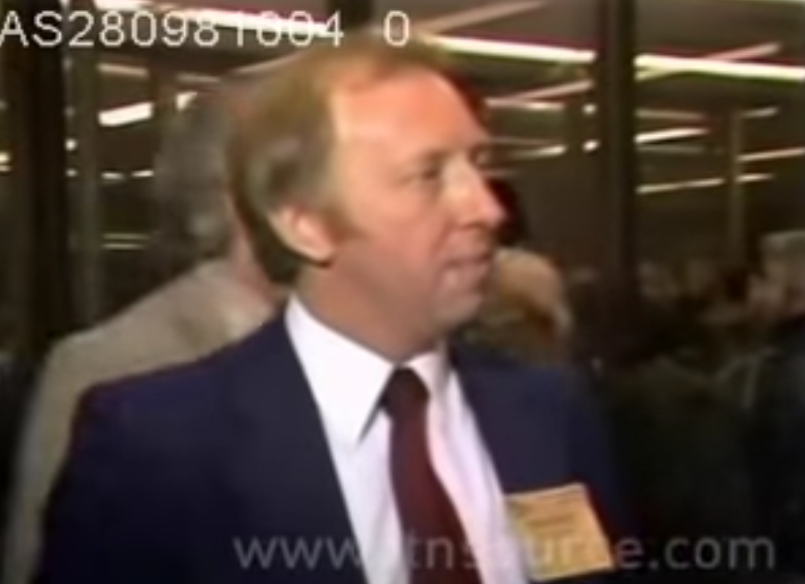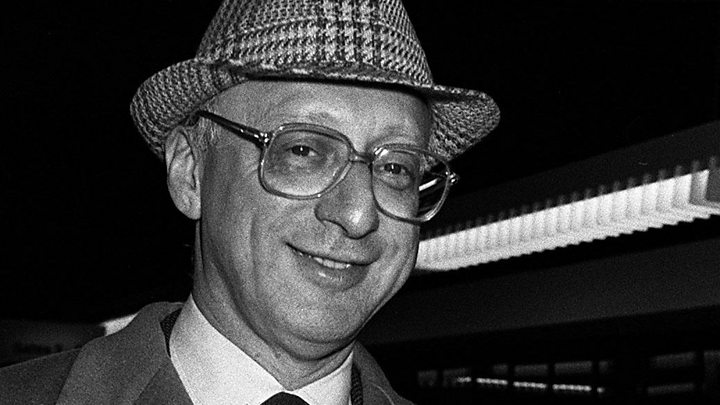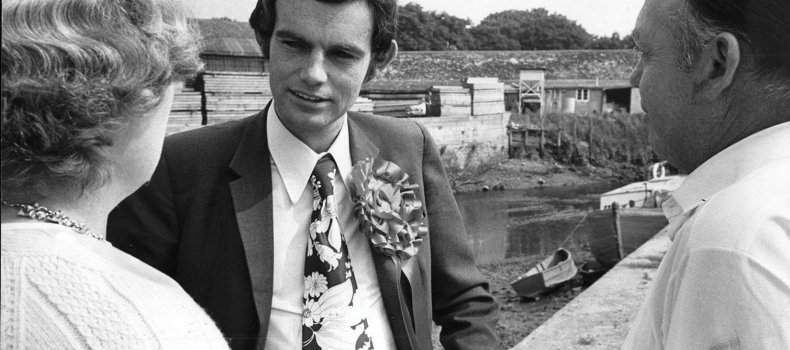#OTD 1981. Denis Healey beats Tony Benn to the Deputy Leadership of the Labour Party
Healey secures the victory by 50.426% to 49.547% after a bitter six month battle
A thread on the contest that was decided by ‘half the hair of an eyebrow’
Healey secures the victory by 50.426% to 49.547% after a bitter six month battle
A thread on the contest that was decided by ‘half the hair of an eyebrow’
In the 1976 Labour leadership contest, Denis Healey and Tony Benn both put themselves forward to succeed Callaghan as Prime Minister.
Benn secured more votes than Healey on the first round but both failed to make the final two.
Benn secured more votes than Healey on the first round but both failed to make the final two.
In the aftermath, Joe Ashton claims to have told Benn that he would never become leader while it was elected by MPs alone.
Benn was said to have replied ‘ok we will change the rules’ https://youtu.be/b_xMDMvBYj0 ">https://youtu.be/b_xMDMvBY...
Benn was said to have replied ‘ok we will change the rules’ https://youtu.be/b_xMDMvBYj0 ">https://youtu.be/b_xMDMvBY...
On the night of Thatcher’s 1979 victory, Benn noted in his diary:
‘I have the freedom to speak my mind and this is probably the beginning of the most creative period of my life. I am one of the few ex-ministers who enjoys opposition and I intend to take full advantage of it’
‘I have the freedom to speak my mind and this is probably the beginning of the most creative period of my life. I am one of the few ex-ministers who enjoys opposition and I intend to take full advantage of it’
A year later Peter Shore blamed Benn for a mood of ‘deliberately poisoned and aggravated sense of betrayal’ which dominated both the 1979 and the 1980 conferences
At the 1980 conference Ron Hayward urged delegates to start respecting each other again: ‘we need more do-ers not boo-ers’.
He warned activists that ‘you have no right to question the sincerity’ of speakers.
He warned activists that ‘you have no right to question the sincerity’ of speakers.
At the same conference, Benn called for a Labour daily newspaper because of the ‘role of the Tory press and of the Tories in the BBC and ITN in distorting the message of the party before it reaches the public’.
A good documentary on Benn’s rise within the party is explored here: https://www.youtube.com/watch?v=Rq-ybgWu91o&t=272s">https://www.youtube.com/watch...
Over the next few years Benn organised to alter the leadership rules – culminating in the Wembley Conference – outlined in greater detail here. https://tidesofhistory.com/2020/02/04/labour-left-takes-control-tony-benn-and-the-1981-wembley-conference/">https://tidesofhistory.com/2020/02/0...
In April 1981, Benn tested the new electoral system by challenging Denis Healey for the Deputy Leadership which Healey had won unopposed immediately after losing the 1980 contest to Foot.
Michael Foot warned Benn not to do so:
‘it would lacerate the party if you did, would be deeply divisive, would ruin the annual conference and would make it much harder for us to be elected at the next election’
‘it would lacerate the party if you did, would be deeply divisive, would ruin the annual conference and would make it much harder for us to be elected at the next election’
A group of Tribune MPs signed a letter urging Benn not to stand.
Joe Ashton told Benn ‘I don’t think you can win. And also you won’t do yourself any good and I don’t think it’ll do the party any good’.
Joe Ashton told Benn ‘I don’t think you can win. And also you won’t do yourself any good and I don’t think it’ll do the party any good’.
Benn announced his candidature for the Deputy Leadership at 3am and argued that elections are a ‘healing’ process.
Benn recorded in his diary, the contest was important as & #39;you can’t go on for ever and ever pretending to be a socialist party when you’re not’.
Benn recorded in his diary, the contest was important as & #39;you can’t go on for ever and ever pretending to be a socialist party when you’re not’.
Benn centred his campaign on Labour& #39;s failures
He told his supporters that they would be ‘mad’ if it ‘did not recognise that the last five Labour governments, when it came to the crunch, were they really going to implement the manifesto or capitulate to the forces of capital?’
He told his supporters that they would be ‘mad’ if it ‘did not recognise that the last five Labour governments, when it came to the crunch, were they really going to implement the manifesto or capitulate to the forces of capital?’
He observed that ‘the decay of capitalism’ was creating the conditions for ‘democracy and socialism’ which ‘has given hope to millions of people who have sunk into despair’.
Benn argued that ‘the greatest problem that we face is not that our policies are unpopular. The problem is that many people don’t believe what we say and don’t know whether we would do it if we were elected’.
A young Jeremy Corbyn wrote in London Labour Briefing that the contest was essential as ‘another phase in the growth of democratic accountability in the movement’.
Denis Healey – who had been muted during the 1980 leadership contest – did not particularly want the job he found ‘disagreeable and which in itself was not worth having.
Healey later claimed ‘however, it was essential to deny it to Tony Benn’.
Healey later claimed ‘however, it was essential to deny it to Tony Benn’.
Healey centred much of his campaign around an attack on the culture of the Bennites.
He lamented the loss of ‘loyal party members’ who have been replaced by ‘humourless newcomers who preach the doctrine of sectarian hate’.
He lamented the loss of ‘loyal party members’ who have been replaced by ‘humourless newcomers who preach the doctrine of sectarian hate’.
Healey questioned the culture of the ‘self-appointed activists’ who ‘demand more democracy’ but ‘want the exact opposite’. He argued that ‘the extremists have nothing in common with the ideals of our movement’
Healey had a different take than Benn on the ‘inevitability’ of his socialism:
‘You hear it on every doorstep, at the factory bench, in the shopping centre. Ordinary decent men and women whose support we should be able to take for granted are worried stiff that our party……
‘You hear it on every doorstep, at the factory bench, in the shopping centre. Ordinary decent men and women whose support we should be able to take for granted are worried stiff that our party……
....has been taken over by the bully boys who howl down free speech at party rallies, who reject the ballot box in favour of violence on the streets’.
As the contest kicked off few gave Benn a chance
Shore, the Shadow Chancellor, delivered a scathing attack on Benn, arguing that he was the ‘cuckoo in the nest’ : ‘the ultimate betrayal is to trick and deceive our party and our own people to promise what we cannot deliver’
Shore, the Shadow Chancellor, delivered a scathing attack on Benn, arguing that he was the ‘cuckoo in the nest’ : ‘the ultimate betrayal is to trick and deceive our party and our own people to promise what we cannot deliver’
He claimed the left was ‘unhinged by electoral defeat, frantically searching for its cause and remedy, misled and misguided by shrewd and calculated demagogy, the party has been increasingly persuaded that the real cause of its problems lay…in duplicity and betrayal’.
He claimed that Benn was a fraud ‘just as there are villains, there must also be a hero. A man on a white horse, a sea-green incorruptible…of single minded faith, purpose and resolution.’
Harold Wilson labelled Benn and his supporters as ‘barmy’. In a dig at his policies he claimed that Benn ‘immatures with age’ but that he had been ‘a very good Post-Master General in the 1960s who gave us pretty stamps’
The biggest criticism came from Michael Foot who read out a twenty-four-page statement at a Shadow Cabinet:
‘His only honest course now is to stand against me. It is clear that what he is challenging is the good faith of the Shadow Cabinet in carrying out its duties’
‘His only honest course now is to stand against me. It is clear that what he is challenging is the good faith of the Shadow Cabinet in carrying out its duties’
Benn rejected the criticism arguing
& #39;I believe in elections…I don’t believe in a one party state. To try to deny Labour the right to a choice of candidates is unwise and indicates that democracy and elections are bad things’
& #39;I believe in elections…I don’t believe in a one party state. To try to deny Labour the right to a choice of candidates is unwise and indicates that democracy and elections are bad things’
Benn bypassed traditional media and took his message to ‘the people’ in town halls, fringe meetings, rallies and folk festivals: ‘people look to us to give them hope…we must bring out what is best and build on the hopes that is In the hearts and minds of our members’.
Benn called for seismic changes to ‘restore the rights of self-government to the British people’, via import controls, the abolition of the House of Lords, withdrawal from the European Community, unilateral disarmament and the removal of American cruise missile bases.
Benn also engaged with new issues, such as the banning of Page Three, because women ‘are made to feel that they are failures’ and manipulated into thinking ‘their husbands would rather be off with somebody who looks like a dolly bird in the Daily Star’.
As riots broke out in Liverpool and London, Benn also argued that Britain was heading towards a ‘police state’:
‘re-equipping the police with offensive weapons will be interpreted as a deliberate policy of holding people down and blanking out all expressions....
‘re-equipping the police with offensive weapons will be interpreted as a deliberate policy of holding people down and blanking out all expressions....
Supporting Benn’s campaign was the NUM rising star Arthur Scargill, who urged Benn to give priority to ‘the common ownership of television, radio and the newspapers and the media’ because of the ‘vitriolic campaign’ against the left.
Scargill called for the party to be ‘cleansed of people who do not support the concept of a Socialist Britain’.
In June, John Silkin joined the race as a third candidate. This would later prove crucial in splitting the soft-left vote of MPs.
A test for Labour presented itself in a by-election, held in the Rugby League Labour heartland of Warrington.
An increasingly affluent area, Labour attacked the SDP candidate Roy Jenkins as ‘too posh’ for Warrington.
An increasingly affluent area, Labour attacked the SDP candidate Roy Jenkins as ‘too posh’ for Warrington.
Labour held on but it was seen as a major setback for the party.
In the aftermath David Owen declared it ‘a new era in British politics’ and the bookmakers made the SDP favourites to become the main opposition party.
In the aftermath David Owen declared it ‘a new era in British politics’ and the bookmakers made the SDP favourites to become the main opposition party.
Labour’s decline in a heartland are was pinned on Benn by Healey, due to the of ‘activist elitism’ whereby a narrow band of hard-left enthusiasts dominated branch life.
Healey accused the hard-left of contempt for traditional labour voters who ‘deny the vote to the average party member on the grounds that he is too idle or too susceptible to manipulation by the capitalist press to deserve it’
Healey argued that Benn’s affluent supporters ‘do not care whether the Labour Party wins the next election or not. They do not care how many members give up in disgust at their sour and intolerant sectarianism’.
The leader of the railway union Sid Weighell dubbed the Bennite ‘public schoolboys’ - such as Lansman, Corbyn and Mullin – as ‘socialists with silver spoons in their mouths…they have never had to suffer. They don’t understand the need for loyalty if we are to achieve our aims’.
The attacks on Benn continued.
Frank Chapple, leader of the electricians union, claimed that Benn wants ‘to concentrate power in the hands of the select few conspirators’.
Frank Chapple, leader of the electricians union, claimed that Benn wants ‘to concentrate power in the hands of the select few conspirators’.
‘MPs, councillors, even the party itself are all to be puppets of cliques on management committees and abused and intimidated and replaced if they step out of line and cross Benn’s commissars’.
But Benn continued to enjoy the support of the grassroots membership.
In June, Benn was struck down with illness and a sudden ‘tingling in my legs and hands’ and was hospitalised with a suspected case of Guillan-Barré syndrome.
Some of is supporters believed he had been poisoned and doctors were said to have tested for arsenic.
Some of is supporters believed he had been poisoned and doctors were said to have tested for arsenic.
Another theory was that Benn had an adverse reaction to the huge amounts of coffee whitener he was using in his tea as he travelled across the country.
When Benn’s whereabouts were known, journalists camped outside his hospital.
A reporter tried to get in dressed as a doctor while a photographer was admitted to casualty pretending to have leg pain but was found with a camera
A reporter tried to get in dressed as a doctor while a photographer was admitted to casualty pretending to have leg pain but was found with a camera
At the TUC in Blackpool, Michael Foot observed an ‘infantile and trivial’ culture that could prevent it from winning the 1983 election.
He argued ‘if we speak in the language of bitterness and sectarianism the nation will turn its back on us’
He argued ‘if we speak in the language of bitterness and sectarianism the nation will turn its back on us’
The tensions within the Labour movement came to ahead as the contest climaxed in September. With unemployment continuing to spiral, Labour sought to unite the through a series of mass rallies. https://twitter.com/labour_history/status/1307207926512263168">https://twitter.com/labour_hi...
As the campaign neared its conclusion, Benn secured the support of the CLPs, where they was a strong left-wing influence on the GMCs.
Healey won the support of a majority in the parliamentary party, which was positioned more to the right.
Healey won the support of a majority in the parliamentary party, which was positioned more to the right.
In a decisive move, Neil Kinnock – along with 34 others – chose to back the third candidate John Silkin, to prevent Benn from securing victory.
In a scathing article in Tribune – for which Kinnock was never forgiven on the left – he took aim at the ‘insignificant ravers’ who were misleading the left through ‘a fantasy that insults adult intelligence, invites derision and guarantees disappointment’.
In a bitter TV debate the pair – joined by Silkin – made a final pitch to the country. https://youtu.be/lZXHrOSpNa0 ">https://youtu.be/lZXHrOSpN...
Benn claimed that ‘if we stick to our policies and unite around them and are free to discuss how they should be developed…we shall win a landslide victory as we did in 1945’
Benn believed that ‘a political education in socialist values is crucial’ to Labour reviving itself.
Benn believed that ‘a political education in socialist values is crucial’ to Labour reviving itself.
‘It is upon our shoulders that the responsibility lies to do it and do it in our own lifetime for there may not be much time left’
Healey opted to attack the mentality that had engulfed the left:
‘the play was a great success but the audience was a failure’.
‘the play was a great success but the audience was a failure’.
Healey claimed an increasing disconnect between the enthusiasm of the activist and the ordinary voters.
The Bennites ‘reject every sort of politics except the doctrinaire, class ridden theories they have dredged up from the silt of forgotten Marxist textbooks’.
The Bennites ‘reject every sort of politics except the doctrinaire, class ridden theories they have dredged up from the silt of forgotten Marxist textbooks’.
He accused them of a snobbery and disregard for the voter for ‘if you would rather enjoy your garden, go fishing or even watch the television than listen to them spouting their cant, they say you have no right to a view about anything that matters’.
Concluding the contest, Healey argued that it was a fight for the ‘soul of our movement’ and asked the question whether it would remain ‘tolerant, comradely and free-minded, respecting a diversity of views?’
Or ‘will our movement fall into the hands of the bigots, the sectarians, the elitists who insist on uniformity and supress independence? If that happens we shall not only forfeit power, but shall deserve it forever.’
In September 1981, at Labour Conference, few could confidently predict the outcome.
The Sunday Times claimed that ‘a Benn victory – coupled with a Thatcher catastrophe and/or the organisational failure of the SDP – could be followed by a Benn government’ after 1984.
The Sunday Times claimed that ‘a Benn victory – coupled with a Thatcher catastrophe and/or the organisational failure of the SDP – could be followed by a Benn government’ after 1984.
The result could hardly have been closer.
Healey clung on by less than one per cent by ‘half the hair of an eyebrow’ as he later put it by 50.426% to 49.547%.
Healey clung on by less than one per cent by ‘half the hair of an eyebrow’ as he later put it by 50.426% to 49.547%.
The decision by NUPE to put its 600 votes behind Healey and the abstention by Kinnock and the Tribune Group proved to be the decisive.
In the immediate aftermath bitterness and acrimony spilled out into the bars of the Brighton Hotel, when Kinnock was spat at.
He claims to have ended up ‘beating the shit’ out a young Bennite supporter in a toilet of the conference hotel who tried to fight him
He claims to have ended up ‘beating the shit’ out a young Bennite supporter in a toilet of the conference hotel who tried to fight him
At a fringe meeting that evening, a young Jeremy Corbyn warned Kinnock and his supporters to expect ‘some discomfort from the rank and file’ in their constituencies. https://www.youtube.com/watch?v=uZKNCXxHL_g">https://www.youtube.com/watch...
For those at the heart of the battle, there was a belief, expressed by Roy Hattersley of ‘the absolute necessity to avoid a repetition of the public spectacle that we have seen’
After the result, Benn recorded it as a great victory for socialism:
‘It has been a staggering result with all the media against us…It has been far more successful than I could possibly have dreamed at the beginning’
‘It has been a staggering result with all the media against us…It has been far more successful than I could possibly have dreamed at the beginning’
Jon Lansman declared it a ‘brilliant result’ to be ‘just less than 1% below Healey is a terrific result’.
Lansman was quick to say that ‘the campaign for the policies and democracy will go on and there is nothing that is going to be stopping it’ https://www.youtube.com/watch?v=61-HMnbTTJw">https://www.youtube.com/watch...
For Gerald Kaufman, the result signalled that Labour had ‘clinged by its fingernails to reality and sanity…and that made it possible for it to be saved’.

 Read on Twitter
Read on Twitter